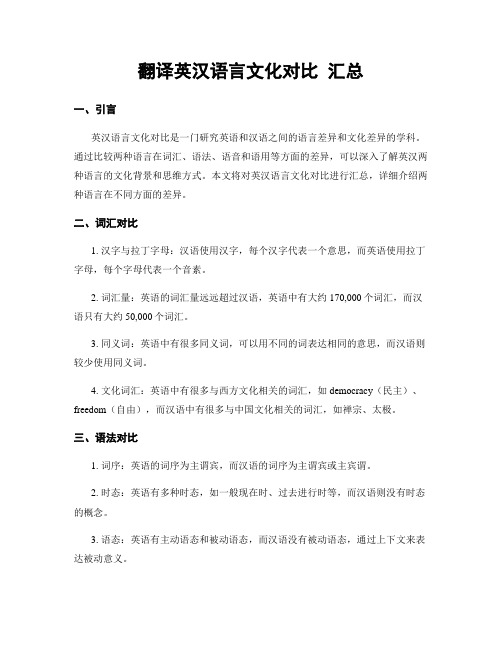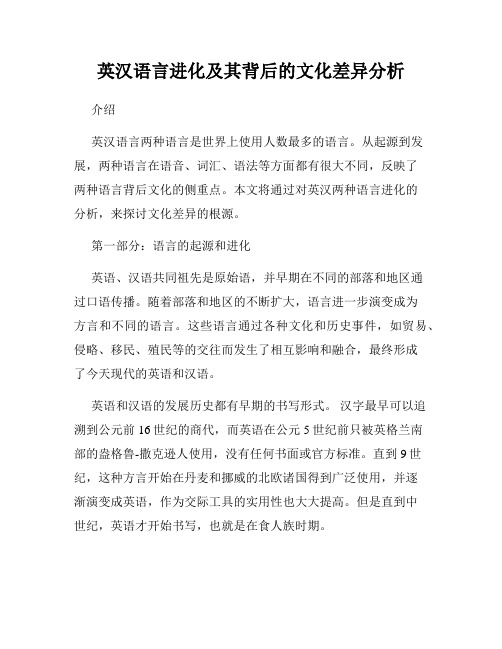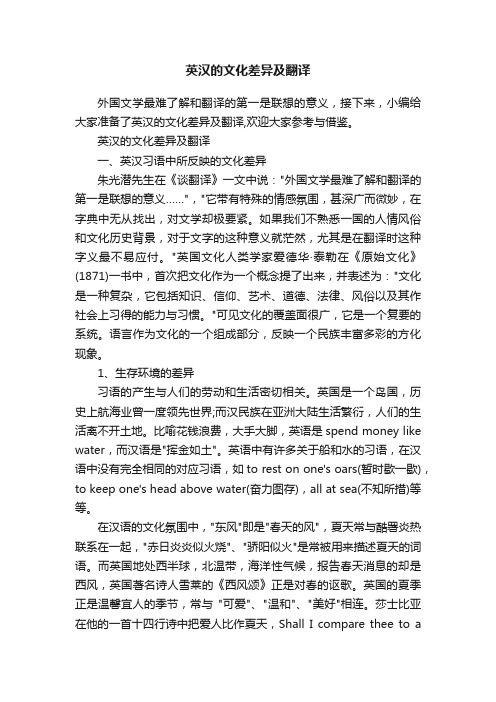英汉语言及文化差异
翻译英汉语言文化对比 汇总

翻译英汉语言文化对比汇总一、引言英汉语言文化对比是一门研究英语和汉语之间的语言差异和文化差异的学科。
通过比较两种语言在词汇、语法、语音和语用等方面的差异,可以深入了解英汉两种语言的文化背景和思维方式。
本文将对英汉语言文化对比进行汇总,详细介绍两种语言在不同方面的差异。
二、词汇对比1. 汉字与拉丁字母:汉语使用汉字,每个汉字代表一个意思,而英语使用拉丁字母,每个字母代表一个音素。
2. 词汇量:英语的词汇量远远超过汉语,英语中有大约170,000个词汇,而汉语只有大约50,000个词汇。
3. 同义词:英语中有很多同义词,可以用不同的词表达相同的意思,而汉语则较少使用同义词。
4. 文化词汇:英语中有很多与西方文化相关的词汇,如democracy(民主)、freedom(自由),而汉语中有很多与中国文化相关的词汇,如禅宗、太极。
三、语法对比1. 词序:英语的词序为主谓宾,而汉语的词序为主谓宾或主宾谓。
2. 时态:英语有多种时态,如一般现在时、过去进行时等,而汉语则没有时态的概念。
3. 语态:英语有主动语态和被动语态,而汉语没有被动语态,通过上下文来表达被动意义。
4. 冠词:英语中有冠词a/an和the,用于限定名词,而汉语没有冠词。
5. 代词:英语中有主格、宾格、所有格等代词形式,而汉语的代词形式相对简单。
四、语音对比1. 音素:英语有大约44个音素,而汉语有大约21个音素。
2. 音调:汉语是一种声调语言,有四个基本的声调,而英语则没有声调。
3. 发音规则:英语的发音规则相对复杂,存在很多不规则发音,而汉语的发音规则相对简单。
五、语用对比1. 礼貌用语:英语注重礼貌用语的使用,如please(请)、thank you(谢谢),而汉语注重尊称的使用,如先生、女士。
2. 谦虚语气:英语中常使用谦虚语气来表示客套和礼貌,如I'm sorry(对不起),而汉语则较少使用谦虚语气。
3. 文化差异:英语和汉语的语用差异也反映了两种文化的差异,如英语中的直接表达和汉语中的间接表达。
2024年浅析英汉互译中的文化差异

2024年浅析英汉互译中的文化差异英汉互译不仅是语言的转换,更是文化的交流。
由于英汉两种语言所属的文化背景、历史传统、价值观念等存在显著差异,翻译过程中往往会遇到诸多挑战。
本文旨在探讨英汉互译中的文化差异,并分析如何在翻译中妥善处理这些差异。
一、语言习惯差异英汉两种语言在语法结构、句子构造和表达习惯上存在明显的不同。
英语注重形式逻辑,句子结构严谨,常使用长句和复合句;而汉语则更注重意合,句子简短明了,多使用并列结构和流水句。
在翻译时,需要灵活调整句子结构,以适应目的语的表达习惯。
例如,英语中的定语从句和状语从句在汉语中可能需要转化为独立句或者前置修饰语,以确保译文的流畅和自然。
二、词汇文化内涵词汇是语言的基本单位,也是文化信息的载体。
英汉两种语言中的词汇往往承载着不同的文化内涵。
一些在英语中具有特定文化背景的词汇,在汉语中可能找不到完全对应的表达。
反之亦然。
在翻译时,需要深入了解词汇的文化内涵,选择恰当的译文,避免误解和歧义。
例如,“dragon”在英语中通常代表着邪恶和凶猛,而在汉语中则是吉祥和力量的象征。
因此,在翻译时需要充分考虑目标语言读者的文化认知,以避免产生误解。
三、习语与俚语翻译习语和俚语是语言中富有表现力的部分,它们通常蕴含着丰富的文化内涵和历史背景。
英汉两种语言中都有大量的习语和俚语,这些表达在直译时往往难以传达原文的含义。
因此,在翻译时需要对习语和俚语进行深入的研究和理解,找出它们在不同文化中的对应表达或者采用意译的方式传达原文的语义和情感色彩。
同时,还需要注意保持原文的风格和韵律美感,以使译文更具吸引力和感染力。
四、思维方式的差异英汉两种语言使用者的思维方式也存在差异。
英语国家的人们往往更注重逻辑分析和形式推理,而汉语国家的人们则更注重整体思维和直观感悟。
这种差异在翻译中表现为对同一事物的描述和表达方式的不同。
因此,在翻译时需要充分考虑目标语言读者的思维习惯,适当调整表达方式,以使译文更符合目标语言读者的阅读习惯和审美需求。
英汉语言进化及其背后的文化差异分析

英汉语言进化及其背后的文化差异分析介绍英汉语言两种语言是世界上使用人数最多的语言。
从起源到发展,两种语言在语音、词汇、语法等方面都有很大不同,反映了两种语言背后文化的侧重点。
本文将通过对英汉两种语言进化的分析,来探讨文化差异的根源。
第一部分:语言的起源和进化英语、汉语共同祖先是原始语,并早期在不同的部落和地区通过口语传播。
随着部落和地区的不断扩大,语言进一步演变成为方言和不同的语言。
这些语言通过各种文化和历史事件,如贸易、侵略、移民、殖民等的交往而发生了相互影响和融合,最终形成了今天现代的英语和汉语。
英语和汉语的发展历史都有早期的书写形式。
汉字最早可以追溯到公元前16世纪的商代,而英语在公元5世纪前只被英格兰南部的盎格鲁-撒克逊人使用,没有任何书面或官方标准。
直到9世纪,这种方言开始在丹麦和挪威的北欧诸国得到广泛使用,并逐渐演变成英语,作为交际工具的实用性也大大提高。
但是直到中世纪,英语才开始书写,也就是在食人族时期。
不同的历史事件和文化交流的引入,塑造了两种语言特有的形态和规则,这种形态和规则反映了两种语言背后不同的文化价值观和传统习俗。
第二部分:英汉文化的不同之处(一)语音差异英汉语言之间最大的基础分歧是语音。
英语的语音系统中,重音在单词内、句子中具有至关重要的地位。
而汉语没有任何一种音素笃定的重音,声调变化导致了不同含义的单词出现。
例如,“ma”第四声是“吗”疑问语气的语尾,“ma”第二声是骂人的粗话。
(二)词汇差异任何两种语言之间要比较词汇的不同,需要从不同的文化和历史背景中获取意义。
在英语中,许多单词都来自拉丁语、希腊语,如cedo(前进)、certus(确定)、necro(死亡的),也有不少单词来自古诺斯语、盎格鲁-撒克逊语,如walk(走)、fire(火)、mother(母亲)。
在汉语中,许多词汇来自于象形文字,例如动物名,也有的来自于古籍如《尚书》、《周礼》等,如“礼”,“畜”,“职”,“工”。
英汉的文化差异及翻译

英汉的文化差异及翻译外国文学最难了解和翻译的第一是联想的意义,接下来,小编给大家准备了英汉的文化差异及翻译,欢迎大家参考与借鉴。
英汉的文化差异及翻译一、英汉习语中所反映的文化差异朱光潜先生在《谈翻译》一文中说:"外国文学最难了解和翻译的第一是联想的意义……","它带有特殊的情感氛围,甚深广而微妙,在字典中无从找出,对文学却极要紧。
如果我们不熟悉一国的人情风俗和文化历史背景,对于文字的这种意义就茫然,尤其是在翻译时这种字义最不易应付。
"英国文化人类学家爱德华·泰勒在《原始文化》(1871)一书中,首次把文化作为一个概念提了出来,并表述为:"文化是一种复杂,它包括知识、信仰、艺术、道德、法律、风俗以及其作社会上习得的能力与习惯。
"可见文化的覆盖面很广,它是一个复要的系统。
语言作为文化的一个组成部分,反映一个民族丰富多彩的方化现象。
1、生存环境的差异习语的产生与人们的劳动和生活密切相关。
英国是一个岛国,历史上航海业曾一度领先世界;而汉民族在亚洲大陆生活繁衍,人们的生活离不开土地。
比喻花钱浪费,大手大脚,英语是spend money like water,而汉语是"挥金如土"。
英语中有许多关于船和水的习语,在汉语中没有完全相同的对应习语,如to rest on one's oars(暂时歇一歇),to keep one's head above water(奋力图存),all at sea(不知所措)等等。
在汉语的文化氛围中,"东风"即是"春天的风",夏天常与酷署炎热联系在一起,"赤日炎炎似火烧"、"骄阳似火"是常被用来描述夏天的词语。
而英国地处西半球,北温带,海洋性气候,报告春天消息的却是西风,英国著名诗人雪莱的《西风颂》正是对春的讴歌。
浅谈日常交际中英汉言语行为的差异及其文化内涵

2、实验研究:采用实验的方法,探究英汉言语幽默在不同文化背景下的理 解和接受程度,为跨文化交际提供更为量化和科学的依据。
3、案例研究:针对具体的跨文化交际场景,分析英汉言语幽默的应用和效 果,为如何在跨文化交际中更好地运用言语幽默提供指导。
4、跨学科研究:可以将心理学、社会学等其他学科的研究方法和成果引入 到英汉言语幽默的研究中,从多角度、多层次探究言语幽默的本质和功能。
2、问候用语
在问候用语方面,英语和汉语也有所不同。英语中的问候语常常涉及天气、 健康等话题,如“How are you?”“Nice weather, isn’t it?”等。而在汉 语中,问候语往往聚焦于对方的生活、工作等方面,如“你吃了吗?”“你到哪 里去了?”等。
3、告别用语
在告别时,英语和汉语同样存在差异。英语中常见的告别语有 “Goodbye”“See you later”等。而在汉语中,告别语则更为丰富,如“再 见”“再会”“后会有期”等。
这些文化内涵的差异对英汉言语行为产生了深远影响。在英语中,由于对狗 的喜爱,许多与狗相关的词汇和表达方式都具有积极的意义。而在汉语中,由于 对龙的崇拜,很多与龙相关的言语行为也被赋予了特殊的含义。
三、如何避免日常交际中英汉言 语行为差异带来的误解
在跨文化交际中,如何避免因英汉言语行为差异而产生的误解呢?首先,我 们要了解对方的文化背景和习惯。在与英语国家的人交流时,我们要尽量采用直 接、坦率的表达方式,避免使用含蓄、委婉的语言。要避免谈论对方认为不合适 的话题,尤其是与其信仰、风俗习惯等相关的内容。
二、文化内涵的探讨
英汉言语行为背后的文化内涵大相径庭。以英国人为例,他们通常以“dog” 作为宠物,对狗有着特殊的喜爱。因此,在英语中,“dog”往往具有积极的语 义内涵,如“lucky dog”表示幸运的人。而中国人则崇拜龙,认为龙是权力、 尊严和繁荣的象征。因此,汉语中有很多与龙相关的成语和词汇,如“龙飞凤 舞”“生龙活虎”等。
英汉翻译中的文化差异与解决方案

英汉翻译中的文化差异与解决方案在当前全球化的背景下,英汉翻译在跨文化交流中扮演着越来越重要的角色。
在这个过程中,文化差异成为了最大的问题之一。
由于汉语和英语的文化背景、历史渊源、社会体制、思维方式等方面的差异,翻译难度逐渐增加。
本文将探讨英汉翻译中的文化差异,并提出相应解决方案。
一、文化差异对英汉翻译的影响文化差异是英汉翻译中不能避免的存在。
这种差异对翻译有很大的影响,主要表现在以下三个方面。
1、语言表达的差异汉语和英语在语法结构、词汇、词序、语态等方面存在非常大的差异。
例如,在英语中,句子强调部分放在句首,而在汉语中放在句尾。
这种差异使得翻译中的语言表达非常困难。
2、逻辑思维的差异汉语和英语的思维方式存在差异。
英语思维方式较为逻辑,重视事物之间的因果关系,而汉语思维方式则较为象征与比喻,强调意象和情感。
这种差异会影响到译者对语言的理解、选择和表达,导致翻译的精度和准确性下降。
3、文化内涵的差异汉语和英语之间还存在文化差异。
汉语文化历史悠久,注重传统伦理道德和家庭观念,而英语文化则更加开放多元,讲究个人自由与权利。
这种文化差异会涉及到翻译中的词汇选择、语言表达、社会价值观念等方面。
二、解决方案为了在英汉翻译中有效解决文化差异问题,以下方案可以提供一些帮助。
1、读懂原文在英汉翻译中,译者必须先理解原文的文化特点和背景知识。
只有读懂原文,才能有效地翻译出高质量的译文。
2、适度的文化调整在翻译时,译者应根据目标语言的受众和文化内涵适度地对原文进行调整。
例如,将饮食和节日的翻译调整为与受众文化相符的词汇和表述方式,从而使其更容易为读者所接受和理解。
3、避免直译直译是指将原文的词汇、语法结构和语言风格等直接转换成目标语言的方式。
在翻译中,直译往往会导致译文的意思不准确或者表达方式拗口,因此应该尽量避免直译的方法。
4、加大文化学习与交流英汉翻译中文化差异的问题需要通过增加语言学习与文化交流来进行解决。
翻译者需要加强对源语言和目标语言的学习,了解不同文化之间的异同,从而提升翻译质量和跨文化交流能力。
英汉两种语言和文化的差异英语作文
英汉两种语言和文化的差异英语作文全文共3篇示例,供读者参考篇1Differences between English and Chinese language and cultureLanguage and culture are closely intertwined, shaping the way individuals of a society communicate and interpret the world around them. English and Chinese are two widely spoken languages that have distinct differences not only in their linguistic structures but also in their cultural norms and values. Understanding these differences can help us better appreciate the complexities of both languages and the richness of the cultures they represent.One of the most evident differences between English and Chinese lies in their writing systems. English uses the Latin alphabet, which consists of 26 letters that combine to form words and sentences. On the other hand, Chinese characters are logograms, where each character represents a specific word or concept. This means that English is an alphabetic language, whileChinese is logographic, which influences the way speakers of each language process information and express themselves.Another key difference between English and Chinese is the grammatical structure. English has a subject-verb-object (SVO) word order, where the subject typically comes before the verb and the object after the verb. In contrast, Chinese has asubject-object-verb (SOV) word order, where the subject precedes the object and the verb comes last. This structural difference can lead to misunderstandings and confusion when speakers of one language attempt to translate into the other.Cultural differences also play a significant role in shaping the languages of English and Chinese. English-speaking culturestend to value individualism, independence, and direct communication. This is reflected in the English language, which places a strong emphasis on the use of personal pronouns and straightforward expressions. In contrast, Chinese culture values collectivism, harmony, and indirect communication. Chinese speakers are more likely to use honorifics and polite language to show respect and maintain social harmony.The concept of “face” is another cultural difference that influences the w ay languages are used. In Chinese culture, “face” refers to one's social standing and reputation, which must bemaintained and protected at all costs. This concept is reflected in the Chinese language through the use of polite forms of address and deferential language when speaking to elders or authority figures. In English-speaking cultures, “face” is less emphasized, and individuals are more likely to express their opinions and emotions openly.Food and dining customs are another area where English and Chinese cultures diverge. English cuisine is diverse and often includes meat dishes, dairy products, and baked goods. Meals are typically served in courses, with each dish highlighted for its flavors and textures. In contrast, Chinese cuisine tends to be more communal, with dishes served family-style and shared among diners. Chinese food often features rice or noodles as staples, along with a variety of vegetables, tofu, and meats cooked in flavorful sauces.In conclusion, the differences between English and Chinese language and culture are vast and varied, reflecting the unique histories, values, and customs of each society. By understanding and appreciating these differences, we can develop a greater sense of cultural awareness and empathy towards others. Language and culture are dynamic and ever-changing, and it is essential to approach them with an open mind and a willingnessto learn. Only then can we truly bridge the divide between different languages and cultures and foster mutual understanding and respect.篇2Differences Between English and Chinese Language and CultureLanguage and culture are deeply intertwined aspects of human society. Comparing English and Chinese, two vastly different languages and cultures, can offer valuable insights into the way people communicate, think, and view the world. In this essay, we will explore the differences between English and Chinese language and culture, focusing on various aspects such as grammar, vocabulary, writing systems, and cultural values.Grammar Differences:One of the significant differences between English and Chinese lies in their grammatical structures. English is an alphabetic language, with a subject-verb-object word order. It uses tenses, articles, and plural forms to convey precise meanings. In contrast, Chinese is a logographic language, with a subject-predicate-object word order. It uses tones, particles, and classifier words to convey nuances of meaning. For example,while English uses plural forms like 's' or 'es' to indicate multiple objects, Chinese uses measure words to count specific objects.Vocabulary Differences:English and Chinese also have different vocabularies due to their unique historical and cultural backgrounds. English has a rich blend of words borrowed from various languages, such as Latin, French, and German. Chinese, on the other hand, has a vast number of characters representing meanings, ideas, and concepts. While English has fewer characters, Chinese has a complex system of radicals, strokes, and character components. This leads to differences in word formation, syllable structure, and pronunciation.Writing System Differences:Another key distinction between English and Chinese is their writing systems. English uses the Latin alphabet, with 26 letters and a set of rules for spelling and pronunciation. Chinese uses characters, with thousands of symbols representing words, phrases, and idioms. Each Chinese character has its own unique stroke order, radical position, and pronunciation. Learning to write Chinese characters requires memorization, practice, and repetition, unlike English letters, which can be learned through phonics and sounds.Cultural Values Differences:English and Chinese cultures also have different values, beliefs, and practices that influence language use and communication styles. English-speaking countries often prioritize individualism, autonomy, and self-expression. In contrast, Chinese-speaking countries prioritize collectivism, harmony, and social relationships. This leads to differences in tone, politeness, and indirectness in communication. For example, English speakers may use direct language to express opinions, while Chinese speakers may use indirect language to avoid conflict.In conclusion, the differences between English and Chinese language and culture are vast and complex, reflecting the unique histories, traditions, and worldviews of their respective societies. Understanding these differences can help bridge communication gaps, foster intercultural understanding, and promotecross-cultural exchange. By appreciating the richness and diversity of both languages and cultures, we can enhance our global awareness, empathy, and respect for one another.篇3Differences between English and Chinese Language and CultureLanguage and culture are two inseparable elements that shape the identity of a group of people. When comparing English and Chinese, two of the world's most widely spoken languages, it becomes evident that their differences go beyond vocabulary and grammar. These differences reflect the unique cultural backgrounds of the speakers and have a profound impact on how communication is conducted between them. In this essay, we will discuss some of the key differences between English and Chinese language and culture.One of the most striking differences between English and Chinese is the writing system. English uses an alphabet system with 26 letters, while Chinese uses characters that represent words or syllables. This fundamental difference in writing systems also reflects the different ways in which these languages are structured. English is a phonetic language, meaning that the sounds of the words are represented by letters, while Chinese is a logographic language, where characters represent meanings.Another key difference between English and Chinese is the use of tones in Chinese. In Chinese, the meaning of a word can change depending on the tone in which it is spoken. There arefour tones in Mandarin Chinese (five in some dialects), and mastering these tones is essential for effective communication. In contrast, English does not use tones to differentiate meanings, relying instead on stress and intonation for emphasis.Cultural differences also play a significant role in shaping the languages and communication styles of English and Chinese speakers. For example, Chinese culture places a strong emphasis on hierarchy and respect for authority. This is reflected in the use of honorifics and formal language forms when addressing superiors or elders. In contrast, English-speaking cultures tend to be more egalitarian, with a greater emphasis on individualism and informality in communication.Another cultural difference between English and Chinese is the concept of face. In Chinese culture, maintaining harmony and saving face are important considerations in communication. This can manifest in indirect communication styles and the use of euphemisms to avoid causing offense. In English-speaking cultures, directness and honesty are often valued in communication, even if it means risking conflict or confrontation.Food culture is another area where English and Chinese cultures diverge. Chinese cuisine is known for its diverse flavors and use of fresh ingredients, with an emphasis on balance andharmony. Meals are often shared family-style, with a variety of dishes served at once. In contrast, English cuisine is more traditional and less diverse, with a focus on meat and potatoes. Meals are typically served in courses, with individual portions for each diner.These are just a few examples of the differences between English and Chinese language and culture. While these differences can sometimes lead to misunderstandings and challenges in communication, they also provide opportunities for cross-cultural learning and appreciation. By understanding and respecting the unique qualities of each language and culture, we can foster greater understanding and cooperation between speakers of English and Chinese.。
英汉文化差异
五、社会文化
英语民族的人见面时喜欢谈天气,中国人爱问 “你去 哪儿?”,“干什麽去?”, “ 吃了吗?”西方人对这几句 话都很敏感和认真。因为在他们看来这些纯属私事。像这样 的见面问候语,应按具体情况做相应的文化转换。又如得到 别人的赞赏时,中国人与英语国家的人的反应也不同。中国 人会说“哪里,哪里”,西方人会说“thank you”,中国人 认为这样不礼貌。
而海洋型文化的人们航海业,渔业,造船业发达如英国 是岛国,故英语中不乏与海洋事业有关的用法,如, “Hoist your sail when the wind is fair.” “In a calm sea, every man is a pilot.” “A small link will sink a great ship.”
汉语中与佛教有关的表达很多,如“跑了和尚跑不了庙”, “做一天和尚撞一天钟”,“借花献佛”,“闲时不烧香,临时抱 佛脚”,“苦海无边,回头是岸”。
道教是中国土生土长的宗教,“灵丹妙药”,“道高一尺,魔 高一丈”,“悬壶济世”等许多词汇都来自道教。儒家学说提倡伦 理教化和道德修养,表现在语言中有“国家兴亡,匹夫有责”, “家不可一日无主,国不可一日无君”,“三纲五常”等。中国的 儒佛道教中都没有至高无上的神,却承认天和天命,比如“人算不 如天算”, “天命不可违”, “天无绝人之路”, “天生我才必有 用”等。
汉语和英语分属两个不同语系。汉语属于汉藏语系,英语属 于印欧语系,语言差异性很大。
从语调层面上看,英语属于语调语言,汉语则为声调语言; 从语法层面上看,现代英语属于综合性,分析性语言,汉语 为典型的分析性语言。 汉语少见头韵,多见尾韵,英语除了常见尾韵,喜押头韵。 汉语由汉字构成,英语由字母构成。 汉字的四声调号,一个字一个音节,铿锵有力,形成汉语特 有的双声叠韵美,因此会给翻译者带来不可逾越的障碍。英语 的单词重音,句子重音,连续等构成的轻重缓急和意群构成的 音步带来英语的音美。
从语言学角度对比中英语言文化差异
从语言学角度对比中英语言文化差异中英语言文化差异是指中文和英文在语言结构、词汇使用、语言习惯等方面存在的差异。
从语言学的角度来看,中英语言文化差异主要体现在以下几个方面:一、语音音素和语音规则的差异中文和英文在语音音素上存在一定差异。
中文中,音节的音质较为简单,音节中的声母和韵母构成了音节的基本重要部分。
而英文中,辅音相对较多,辅音和元音的组合形式也较为复杂。
英文的元音数量较多,元音的发音也比中文更加多变。
二、词汇差异中英语言的词汇有很大的差异。
中文的词汇较为丰富,很多个词汇可以有多种不同的意思,一个字可以表示一个意义,也可以结合其他字形成词组,具有很高的词汇灵活性。
而英文的词汇相对较为简单,虽然英语也有同音或近音的词汇,但在一般情况下,同一个词只有一个特定的意义。
三、句法和语法差异中文和英文在句法和语法上也存在差异。
中文属于屈折语言,名词和形容词没有单/复数、性别、格的变化,这使得中文的句子结构相对简单。
而英文则属于有形态变化的屈折语言,名词和形容词的单/复数、性别、格等变化较多,使得英文的句子结构相对复杂。
四、文化差异中英语言的文化背景也造成了一定的差异。
中文表达更偏重于内涵,强调文化内涵的分享和传递,注重语言的修辞手法,而英文表达更注重事实表述,偏向于简洁和直接。
因为中英两个文化的差异,导致中英语言的使用中也会出现一些行为规范的差异,例如语气的使用、尊称的使用等。
中英语言文化差异在语音音素、词汇、句法和语法等方面都存在一定的差异。
这一差异主要源于两个语言的历史文化差异以及语言的不同特点。
了解和体会这些差异有助于更好地掌握和运用两种语言,促进中英两种文化之间的交流与理解。
英汉语言文化差异的对比分析
英汉语言文化差异的对比分析在今天的全球化时代,中英两国的联系与合作越来越密切。
虽然英汉两国均为世界上使用最广泛的语言之一,但是英汉语言文化之间的差异仍然存在。
本文将会从语音、语法、词汇和文化四个方面,对英汉语言文化差异进行分析比较。
一、语音语音是一种基本的语言要素,英汉语言在语音方面的差异显而易见。
对于英语的元音而言,发音时重点是强调嘴唇的形状,肌肉的收缩与舌尖的位置。
而汉语元音的发音则更多地依靠声带震动的强弱。
比如在英语中, [i:]与[ɪ]两个音是区分大小写音的,而在汉语中,[i:]和[i]的区别更多体现在声调上。
对于辅音而言,汉语和英语又有很大的不同。
例如,英语中的[t]和[d]在后面加了一个[i],则会变成音[ʧ]和[ʤ],而这在汉语里并不存在。
汉语中则有四个声调的区别,对于英语来说,同一音节发音的区别来自于不同的重音位置。
二、语法英语与汉语的语法结构不尽相同。
英语句子的语序、主语和宾语的位置、修饰语之间的关系,等等,都与汉语有着不同的规律。
在英语中,形式主语it动词倒装、有些情况下there做形式主语出现,而在汉语中强调句子中的主语。
同时,英语中主语一般要位于动词前面,而汉语中主语通常出现在动词后面,例如“他吃饭了”。
英语的格语法是一大特点,同样没有直接对应的语法在汉语中,表达方式不彻底迂回,但表述的准确性较高,同时还涵盖了动词及其进行的方向,在说明过程中给予了更多的提示。
汉语则在两个意象之间加以比喻或比对,以描述含义深刻或比较精细的情形。
三、词汇在词汇方面,英汉两语言的差异也是显而易见的。
英文中有大量的拉丁语单词,例如psychology、geography等,在与汉语不同的语言背景下,英文单词的计划性、规律性都较强,且具有一定的符号意义。
而在汉语词汇中,常常喜欢用象声词、象形词等短语表示具体意思,例如“哗啦啦”、“嗷嗷待哺”等,精细致思,特别能描绘出直观生动的场景和情感。
此外,在互联网时代,随着社交媒体、电商平台的飞速发展,英文和中文各自独特的网络语言也有很大差异。
- 1、下载文档前请自行甄别文档内容的完整性,平台不提供额外的编辑、内容补充、找答案等附加服务。
- 2、"仅部分预览"的文档,不可在线预览部分如存在完整性等问题,可反馈申请退款(可完整预览的文档不适用该条件!)。
- 3、如文档侵犯您的权益,请联系客服反馈,我们会尽快为您处理(人工客服工作时间:9:00-18:30)。
名词 若干英语名词在一定的语境中可取代让步, 条件等从句,这是一种言简意赅的意合句。 Beggars must not be choosers. = Since he is a beggar, he must not be a chooser. (既然)(他是)要饭的,就必不回挑肥拣 瘦。
5、英语意合句的汉译问题
4、习俗差异
black sheep 害群之马 ss strong as a horse 身壮如牛 lead a dog’s life 过牛马不如的生活 同一动物含义不一样。 dog dragon
5、历史典故差异 6、社交礼仪和生活习惯差异
二、英汉语言比较
1、综述 “我相信,对于中国学生最有用的帮助是让 他认识英语和汉语的差别,在每一个具体问 题---词形、词义、语法范畴、句子结构上, 都尽可能用汉语的情况来跟英语做比较,让 他通过这种比较得到更深刻的领会。”(语 言学家吕叔湘) 英语—印欧语系,拼音文字,1500多年历史 汉语—汉藏语系,象形文字,6000多年历史
International Women"s Day
商务英语翻译
第二讲 英汉文化、语言对比
一、文化差异
尤金·奈达:“翻译是两种文化之间的交 流。对于真正成功的翻译者而言,熟悉两 种文化甚至比掌握两种语言更重要。因为 词语只有在其作用的文化背景中才有意 义。”
1、思维方式方面
西方人在思维习惯上常在“同”中求“异”,在 思维方式上是从小到大,从未知到已知,突出主 观作用,以主体为中心,主客体界限分明,贯于 逻辑思维、抽象思维。在话语中多用非人称主语 和被动句,很少省略主语。 中方的思维方式偏重形象思维,习惯于在“异” 中求“同”,倾向于整体思维,从大到小,从已 知到未知,从实际出发,注重主客体融合。在话 语中多使用无主句、主动语态,连词使用较少, 文章讲求对称与和谐的完美性。
就语体而言,形合见庄重,而意合就显得 随便。试比较: He had been left alone for scarcely two minutes, and when we came back we found him in his armchair, peacefully gone to sleep ---- but forever. 译文:让他一个人留在房里总共不过两分钟, 当我们再进去的时候,便发现他在安乐椅 上安静地睡着了---- 但已经永远睡着了。
When you look afar, the mountains are green and clear, But no sound of stream is heard when listening near. The flowers remain in full bloom when spring’s away, A human being’s approach the bird doesn’t fray.
所谓形合与意合,主要指句与句(包括以 联合关系配列及以偏正关系配列的句与句) 之间起连接作用的成分是保留还是省略的 一个句法问题。
隐含“条件”从句的汉语意合句与英语形 合句 早知今日,何必当初? If I had known it would come to this, I would have acted differently.
4、英语重形合,但也不乏“意合”手段
非人称主语句 Poor acoustics spoilt the performance. = Because the acoustics was poor, the performance was spoilt. 音响效果不好,演出大为逊色。 The good tidings filled the whole nation with joy. = When the good tidings came, the whole nation was filled with joy. 捷报传来,举国欢腾。
隐含“原因”从句的汉语意合句与英语形合句 地面潮湿,一定下过雨了。 It must have rained, since the ground is wet. 隐含“递进”关系的汉语意合句与英语形合句 汤姆干了这件事,干得非常成功。 Tom did it, and did it very successfully. 隐含“转折”关系的汉语意合句与英语形合句 江山易改,本性难移。 It is easy to change rivers and mountains but hard to change a person’s nature.
祈使句 + and… 此句式中的祈使句相当于一个clause ,言简 意明,容易上口。 Take a wider view, and you will see it differently. = If you take a wider view, you will see it differently. 眼光放远些,你就不会这样看了。
总而言之,在一个复句内部,英语重形合, 汉语则重意合;而在两个独立句之间,似 乎汉语较之英语更重形合。在汉译英的过 程中,若对前者认识不足,我们的译笔就 会“亦步亦趋”而显得呆滞与死板;若对 后者缺乏了解,同样,我们的译笔就回 “照样画葫芦”而痛失它的圆润与自如。
隐含“时间”从句的汉语意合句与英语形 合句 他老是见异思迁。 He is always changing his mind the moment he sees something new
隐含“结果”从句的汉语意合句与英语形 合句 他说得太快,我们不能理解他的意思。 He spoke so rapidly that we could not clearly
地理位置不同,气候和季节差异。 汉语中“东风”是美好和希望的象征。 英国人眼中东风是凛冽的刺骨寒风,报告 春天消息的是和熙、温暖的西风。 中国的夏天“骄阳似火” 英国夏天温馨宜人。 莎士比亚:Shall I compare thee to a summer’s day? Thou art more lovely and more temperate. 雪莱:If Winter comes , can Spring be far behind? (Ode to the West Wind)
定语从句 以隐含原因,让步,条件等表意功能的定语从句取代相 应的状语从句,这种意合句使结构紧凑,行文练达。 I shall pass by the next paragraph, which has nothing to do with the topic in hand. = I shall pass by the next paragraph, because it has…下一段我不准备谈了,(因为)它与讨论问题无涉。 He insisted on building another house, which he actually had no use for. = He insisted on building another house, though he actually …他坚持要再造一幢房屋,(虽然)实际上他并不 需要。 Why waste breath on them, who have turned such an unwilling ear? = Why waste breath on them, since they have turned…(既 然)他们不愿意听,为何对他们白费口舌呢?
A little of everything and nothing at all. 如果什么事情都是浅尝辄止,终将一事无成。 Admonish your friends in private, praise them in public. 在私底下要忠告你的朋友,而在公开场合则要表扬你的朋友。 又如: He who imagines he can do without the world deceives himself much; but he who fancies the world cannot do without him is still more mistaken. 如果有人想象他可以不要旁人独自生活,他是深深地欺骗自 己;但是,如果有人幻想旁人离了他不行,他就错得更厉害 了。
Байду номын сангаас
汉语多四字结构、意合力强、形式齐整、 音律悦耳、词格丰富、意境性强,重整体 感应。 英语优势在于结构严密,重客观描写。 季羡林:“东方文化体系的思维模式是综 合的而西方则是分析的。” 西湖如明镜,千峰凝翠,洞壑幽深,风光 绮丽。 The West Lake is like a mirror,embellished all around with green hills and deep caves of enchanting beauty.
2、宗教信仰方面
中国受佛教影响的。 西方多信奉基督教。
3、生存环境
语言的产生与人们的劳动和生活息息相关。 英国是岛国,航海业发达,许多习语源于 航海。 汉族人在亚洲大陆繁衍生息,人们的生活 离不开土地。农业耕作是人们生存的主要 方式,农谚较多。 all at sea 不知所措 drunk as a sailor 烂醉如泥 拔苗助长 瓜熟蒂落 对牛弹琴
片语句 A fall in the pit, a gain in your wit. = When you have a fall into the pit, you had a gain in your wit. 吃一堑,长一智。 First time stranger, second time friends. = People are strangers when they meet for the first time; and good friends for the second time. 一回生,二回熟。
